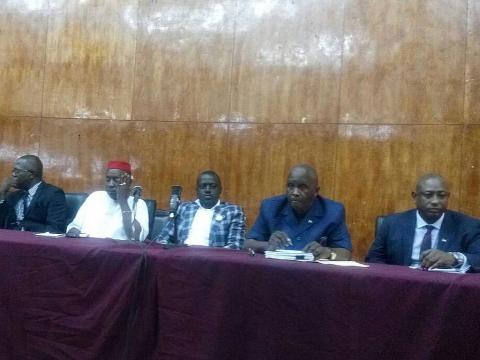By Kemo Cham
The Sierra Leone government is set to end 10 years of state subsidy on petroleum products, officials have confirmed, bringing to an end weeks of speculation on the vexed issue that has left civil society and political opposition up in arms.
Government officials said last week at a special press conference that the decision was being taken as part of austerity measures announced in the beginning of October.
The televised event was the climax of a month-long “nationwide consultation”, according to Information Minister Mohamed Bangura, whose ministry is spearheading the awareness-raising campaign on the eventual removal of the fuel subsidy.
On October 3 President Ernest Bai Koroma announced stringent measures he said were aimed at salvaging the country’s struggling economy. They included substantial cuts in government spending on recurrent expenditure as well as some capital projects including procurement of vehicles and stationery as well as some of the road works funded by the state.
The austerity measures were announced shortly after the end of a visit by an International Monetary Fund (IMF) delegation to the country. The Fund had two main concerns with the government's operation - it's tax collection style and the fuel subsidy.
Statistics from the Petroleum Unit in the Ministry of Trade show that between 2011 and 2016 government spent either through physical subsidy or tax waiver some Le 937 billion (roughly over US$130m) on fuel subsidy.
The government said it had been subsidising fuel since 2007, when President Ernest Bai Koroma assumed office, something they inherited from the previous administration.
Between 2007 and 2012, the subsidy has been across the board. But from 2012 the government introduced the two-tier fuel pricing system which meant that subsidy on fuel bought by big businesses and companies was removed. Only those buying fr cars and home use paid for the subsidised price.
Officials claimed that the subsidised had occasioned massive smuggling of fuel into neighbouring countries especially Guinea, where prices are higher.
Within the last few weeks several people have been detained through police operations for their alleged involvement in an fuel smuggling ring.
“It cannot be business as usual. The austerity has to go right across the board, like the subsidy, which has to be removed,” Transport Minister Leonard Balogun Koroma said. He said it was time for the government to “recalibrate” its economy having found that things weren’t working in the present circumstances.
One major concern, especially among civil society organisations, is the effect this move will have on ordinary people. They say it will have a ripple effect on the prices of basic commodities as a concomitant result of the increase in transportation cost.
Transport minister assured the public that discussions were underway with the drivers’ union to reach an agreeable transport fare system.
But some people went further to question the government's claim that it really has been providing subsidy for as long as it said it had.
The pressure group, Native Consortium and Research Centre, demanded documentary evidence to back government's claim.
"As a pro-poor movement, we want to let it be known to every Sierra Leonean that this is a very dishonest move by the government to subject the poor people of this country to further suffering, as any increase in the price of fuel will affect the least person in the village, because of the ripple effect it will have on the prices of goods and services," it says in a statement.
Another civil society organisation, Campaign for Good Governance (CGG) has also opposed it. Its Executive Director, Valnora Edwin, blamed on corruption the dire economic situation cited by the government as reason for the decision. She said mismanagement of the country’s resources over the years had afflicted the nation, arguing that the poor and already suffering masses shouldn’t be made to pay the price for that.
Edwin told Politico that government policies needed to take into consideration the overall context when imposing such measures and the impact in the short, medium and long terms.
"We are concerned about the social implications in view of the poverty levels, [and] the continued challenge in accessing efficient and quality basic services. We are of the view it would deepen or create social vices, domestic and sexual violence, crime, corruption," she noted via a text message.
The Government has dismissed these criticisms, saying they are politically motivated.
Those criticising the government do not know the dynamics at the global level of the petroleum industry, Presidential Spokesman Abdulai Bayraytay told journalists. He said austerity measures were not a new phenomenon and not unique to Sierra Leone.
As things stand, it's not a matter of whether subsidy on fuel will be removed, it's more about when this will happen.
As Information Minister Bangura put it, these consultations were meant to prepare minds.
“As a government we have done what we wanted, that’s to say we do not want people to wake up overnight and hear the news through a press release.”
Copyright (c) Politico 2016









